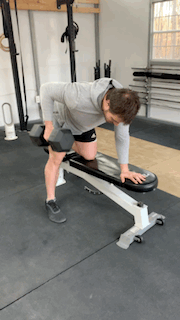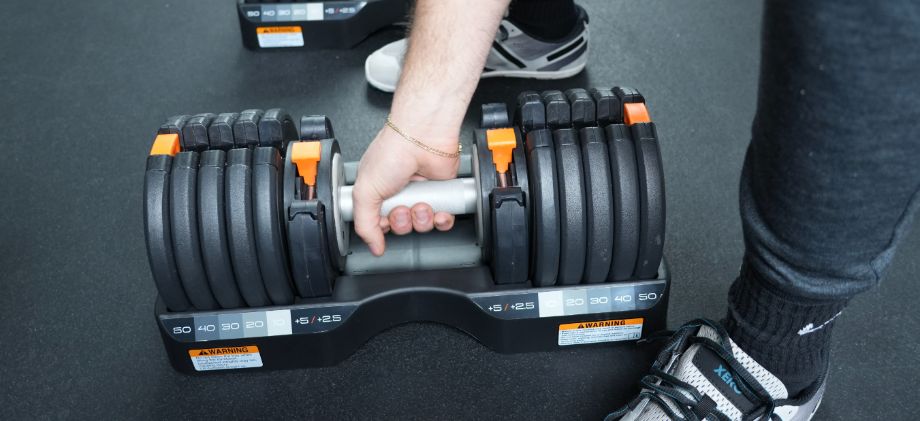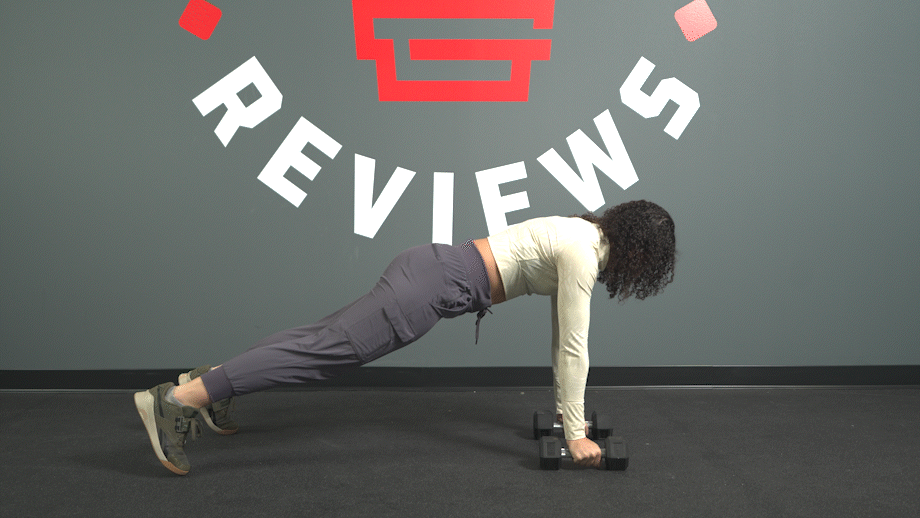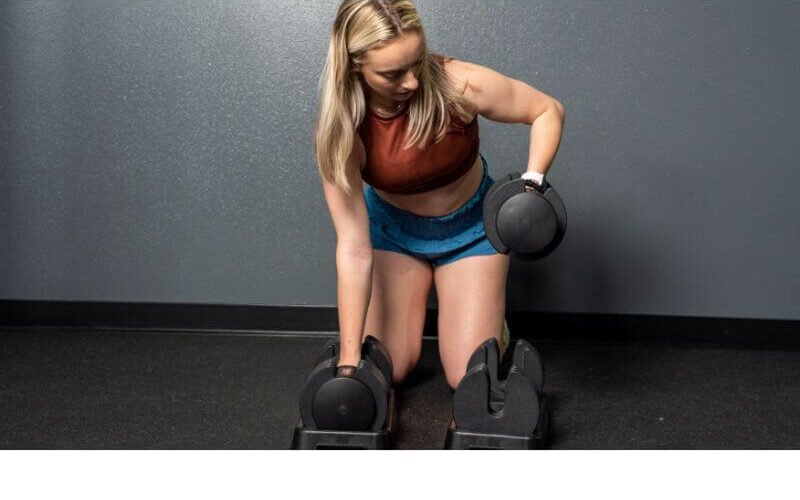We test and review fitness products based on an independent, multi-point methodology. If you use our links to purchase something, we may earn a commission. Read our disclosures.
A lot of strength and muscle gains come from bilateral movements like barbell row, bench presses, bent-over barbell row, and squats. These should form the majority of your workout routine. But don’t sleep on unilateral exercises. Lifting with two hands or on both feet can cover up strength imbalances.
Unilateral exercises like the one-arm dumbbell row can improve your bodybuilding performance, strengthen imbalances between sides, and lead to better back muscle development. Here we’ll learn how to do one-arm dumbbell rows for your upper-body muscle-building pleasure.
Did I mention it works the biceps, too? Now, you’re in.
How To One-Arm Dumbbell Rows
Note: There are many variations of the one-arm dumbbell row. This is the standard/beginner lifter variation.
- Stand side onto a weight bench and place your right knee and right hand on the bench.
- Place your left leg out to the side in a comfortable position and grip the dumbbell in your left hand with your palm facing in.
- Ensure your back is in neutral and the dumbbell is off the floor with your arm extended.
- Holding the dumbbell with a neutral grip, row the weight up towards the side of your body until a muscle contraction occurs in your upper back muscles.
- Pause, slowly return to the starting position and reset and repeat.

Trainer Tips for Form
The one-arm dumbbell row Is a simple exercise that should be a regular part of your workout routine. Here are tips from this certified personal trainer to help you with proper form to get a stronger back.
Ensure Stability
Variations of the unilateral dumbbell row call for less stability to increase the intensity. But for the beginner variation described above, place your knee and hand firmly on the weight bench gives you a secure anchor point to row from.
Keep Your Back Straight
As everyone has different limb lengths, the position you place the leg off the bench varies. But no matter where you put the leg, ensuring your low back is in neutral is paramount to making the most of this exercise.
Shoulders Down & Chest Up
Keeping your shoulder down and chest up puts you in a neutral spine and ensures the correct muscles are doing the work.
Full Range of Motion
Ensuring you have enough space to extend your elbow and to row the dumbbell toward the front of the hip allows you to get the full muscle-building benefits of this exercise. Shortening the movement cheats you out of those hard-earned gains.

Common One-Arm Dumbbell Row Mistakes
The one-arm dumbbell row is NOT an absolute strength exercise but one used to strengthen imbalances between sides, which leads to better hypertrophy. One mistake not isolated to the one-arm dumbbell row is going too heavy. Pushing yourself is great, but not at the expense of good form.
Here are a few other common row mistakes to watch out for.
Shrugging The Shoulder
When the lifter gets fatigued or the weight is too heavy, there is a tendency to shrug the upper traps to pull the dumbbell toward the rib cage. This form mistake jams up the shoulder joint, gives you a sore neck, and takes the emphasis off the upper back. Instead, keep your shoulder down and chest up and discontinue the set when you feel this occurring. (And if you want to work your trapezius muscles, check out our trainer-developed kettlebell trap workout.)
Rounded Lower Back
Setup is crucial when it comes to the one-arm dumbbell row. Ensuring your knee, hand, and leg are comfortable to put your low back in neutral is vital. Take the time to set up this exercise to maintain a neutral spine.
Not Getting Full Range of Motion
You should feel a stretch between your scapula before you begin and a muscle contraction in the biceps, upper back, and lats at the end of the repetition. Doing so ensures you get a full range of motion. Anything less is shorting yourself.
Minimize The Body English
Rotating the torso, jerking the dumbbell, or shrugging with your upper traps makes the dumbbell row easier, and you begin to lose the benefits of this great exercise. Staying secure to the bench, keeping your shoulder down and chest up, and selecting a weight you can do eight to 15 reps with helps handle these problems.
RELATED: The Best Dumbbells for Your Home Gym
You’re Out Of Control
Following on from above, when using body English to row the dumbbell, you lose control with the eccentric (lowering) contraction. Don’t do that and instead, use a weight you can do for eight to 15 reps and lower with control.
4 One-Arm Dumbbell Row Variations
The standard one-arm row is a one of the best back exercises that can build muscle, but when you want to progress, here are a few variations to up your row game. These turn a back exercise into a full-body workout.
RELATED: The Best Bent-Over Row Alternatives

Deadstop Row
The deadstop one-arm row has both feet on the ground and one hand on the bench while in a modified hip hinge position. This 3-point position helps improve core stability, and since you’re starting from a deadstop, you’ll go through a large range of motion for more juicy muscle-building benefits.
Split-Stance Row
Some find the one-arm row tough on their lower back, and the split stance is the perfect remedy. Putting your free hand on the bench and stepping back with your left leg opens up the torso and takes some stress off the lower back.
RDL Row
The Romanian deadlift row is a challenging unilateral dumbbell row exercise. You set up in a single-leg deadlift with your right hand on the bench, your right leg behind you, and standing on your left leg in the hinge position while rowing with the left hand. If you never felt oblique core muscles before, you will now.
Bird Dog Row
The bird dog is an excellent ab exercise that also works the back muscles. Doing a one-arm row from the Bird dog position is a great way to simultaneously challenge your coordination, balance, and strength. The narrower base of support and the reduced points of contact on the weight bench are fantastic ways to up the intensity with a lighter weight.
Useful One-Arm Dumbbell Row Equipment Accessories
Many one-arm row variations call for a flat bench. Now, you could row with one hand on a dumbbell rack or squat rack, but then you will get in the way of other gymgoers. A secure, good weight bench ensures you’ll get the best out of many one-arm row variations.
FAQs: How To Do One-Arm Dumbbell Rows
How do you do a single-arm dumbbell row correctly?
The one-arm dumbbell row is not a technical exercise, but there are a few things to ensure good form. Keeping a neutral spine, the shoulders down, and the chest up and going through a full range of motion goes a long way to do this exercise correctly.
Are one-arm dumbbell rows effective?
One-arm dumbbell rows are effective at reducing muscle imbalances that can exist between sides. Performing these in your back workout improves muscular development between the sides and your bilateral pulling exercises because of improved form and reduced imbalances.
What do one-arm dumbbell rows work?
Did I mention they train the biceps? Other muscle groups the one-arm dumbbell rows work are the forearms, biceps, latissimus dorsi, rhomboids, trapezius, deltoids, and obliques.
Further reading

We’ve got the best massage gun Black Friday/Cyber Monday deals in 2024 so you can gift your fit friend the best recovery tools. Read more

Do you need to go the extra mile? Channel your inner Energizer Bunny with these muscular endurance exercises and training advice from an Olympic weightlifter! Read more

Take a look at our hands-on experience with this free-standing home sauna in our HigherDOSE Infrared Sauna review. Read more

Are you interested in weighted apparel? Check out this OMORPHO weighted clothing review to see if this is a great choice for you. Read more

